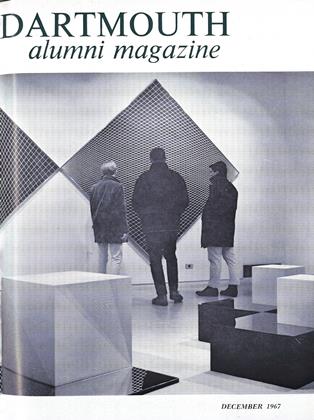An interim statement by the Faculty-Student Committee on Dissent was released last month pending the completion of the formal report on which it is working. The following statement was commended by both the Executive Committee of the Faculty and Palaeopitus "as a guide to student and faculty action and college disciplinary procedures" until the final report appears:
"As an institution committed to fostering the free and critical mind, Dartmouth College seeks to encourage the expression of controversial views - and the freedom to dissent and protest against such views. In light of this commitment, the College should not forbid the appearance of individuals or groups holding controversial opinions. Neither should it permit expressions of dissent which employ means, such as the threat or use of physical force, which hamper the rights of expression of others. To the extent that the College cannot maintain an orderly exchange of ideas, it forfeits , its mandate in the community to protect freedom of inquiry, and so gives up its right to self-discipline.
"The Committee holds that recruitment interviews of students by business firms, academic institutions, government agencies, etc., are in the interests of students seeking to advance their education or careers, and fall within the general principles the Committee has outlined. Representatives of all legitimate organizations should be permitted to recruit at the College, and all students should be able to meet with them unhampered. At the same time, protest against the views the recruiter represents should not be discouraged, so long as the recruiter and those wishing to see him are not restrained. For example, speeches, pickets, or the use of the right to meet with the recruiter by appointment would constitute legitimate, tolerable dissent, while the blocking of access to a building or the threat or use of force against a recruiter would not.
"It is the intent of the Committee not to suggest the prohibition of dissent, but to suggest that the method of dissent ought not to conflict with the purpose of the College. Dissent is not only to be permitted, but to be prized, so long as it is carried out by means consistent with a community committed to the free use of the intellect."
 View Full Issue
View Full Issue
More From This Issue
-
 Feature
FeatureFood for Alumni Thought
December 1967 -
 Feature
FeatureThe Dartmouth-Talladega Alliance
December 1967 By WILLIAM R. MEYER -
 Article
ArticleWith the Big Green Teams
December 1967 -
 Article
ArticleThe Undergraduate Chair
December 1967 By JOHN BURNS '68 -
 Class Notes
Class Notes1923
December 1967 By WALTER C. DODGE, DR. THEODORE R. MINER, TRUMAN T. METZEL -
 Class Notes
Class Notes1941
December 1967 By EARL H. COTTON, LOUIS A. YOUNG JR.
Article
-
 Article
ArticleOUTING CLUB NOTICED IN SWEDEN
December, 1919 -
 Article
ArticleGOVERNOR-ELECT BROWN MADE A LIFE TRUSTEE
December 1920 -
 Article
ArticlePingry Centennial
February 1962 -
 Article
ArticleA Wah Hoo Wah for –
MARCH 1968 -
 Article
ArticleHanover Browsing
June 1954 By HERBERT F. WEST '22 -
 Article
Article1971 FOOTBALL SCHEDULE
JANUARY 1971 By JACK DEGANGE

